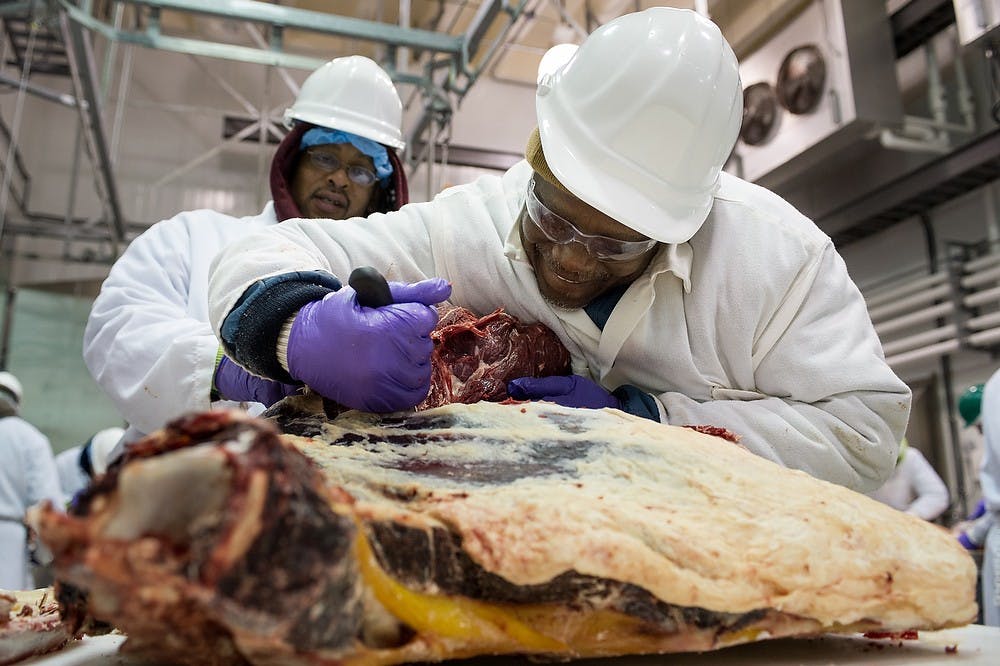After living in a homeless shelter and being unemployed for about nine months, Joe Braunsdorf has a place to stay and a steady income in a field he never imagined he would find himself in — meat processing.
Braunsdorf graduated from Michigan’s Vets to Ag program that trains unemployed veterans, some of whom are homeless, for careers in agriculture.
The past 11 participants underwent a six-week program, taught by MSU faculty and coordinated by MSU’s Institute of Agricultural Technology and received certifications about two weeks ago to work in meat processing and handling.
Participants spent four weeks at MSU’s Kellogg Biological Station, or KBS, in Hickory Corners, Mich., and the last two weeks on campus in the meat laboratory.
The program is free to participants, paid for by state-funded organizations, said Tom Smith, Institute of Agricultural Technology associate director and Vets to Ag coordinator. He said the program also was held in 2009 and 2010, and he hopes to run another session this summer.
Since graduating, the spring 2013 participants have found jobs or are in the process of getting one, including Braunsdorf, who started his new job Tuesday in Plainwell, Mich., at meat-processing company JBS.
“I enjoyed the heck out of it,” Braunsdorf said after his second day of work, adding he was a little sore. “I know where my money is coming from, and I know when it’s coming.”
Braunsdorf was asked by a representative from Vets to Ag to keep a blog throughout his experience, which included earning certifications in hazard analysis and critical control points, ServSafe and American Red Cross first aid, adult CPR and automated external defibrillator, or AED, to increase his employability.
He said he agreed to write about his experiences because he is not afraid to tell his story, and he hopes to inspire other struggling veterans to seek help.
At MSU, participants received hands-on experience working with meat — Braunsdorf’s favorite part of the program.
“You can only talk about cutting meat for so long before you want to get your hands on it,” Braunsdorf said.
Sarah Wells, academic specialist in meat science in the College of Agriculture and Natural Resources, taught the meat cutting portion of the training at the meat lab. She said the group focused on pork the first week and beef the second, and lessons included learning how to use a knife, wearing proper safety gear and proper sanitation procedures.
“There’s always been a demand in recent years for this skill,” Wells said.
At MSU, the veterans stayed at Kellogg Center, ate dorm food and attended a women’s basketball game.
Braunsdorf said he put on 18 pounds since the program started, and the group stayed until the final buzzer at the basketball game because they were having so much fun.
Before the program, Braunsdorf was staying in a homeless shelter, but he now has a place to stay at the KBS and, with help, is searching for an apartment of his own.
“They told us that when we (finished) the program that they will have our back, and they’ve kept their word,” he said.
Animal science senior Taylor Harrison helped with Vets to Ag as part of her independent study, and she talked to the veterans about her background growing up on a small farm, working with livestock and showing cattle.
“They were very interested in it because most of them don’t have an agriculture background at all,” Harrison said. “My favorite part was seeing them graduate and seeing their family members or people they knew there being proud of them.”
Support student media!
Please consider donating to The State News and help fund the future of journalism.
Discussion
Share and discuss “Training program gives former homeless veterans second chance” on social media.







